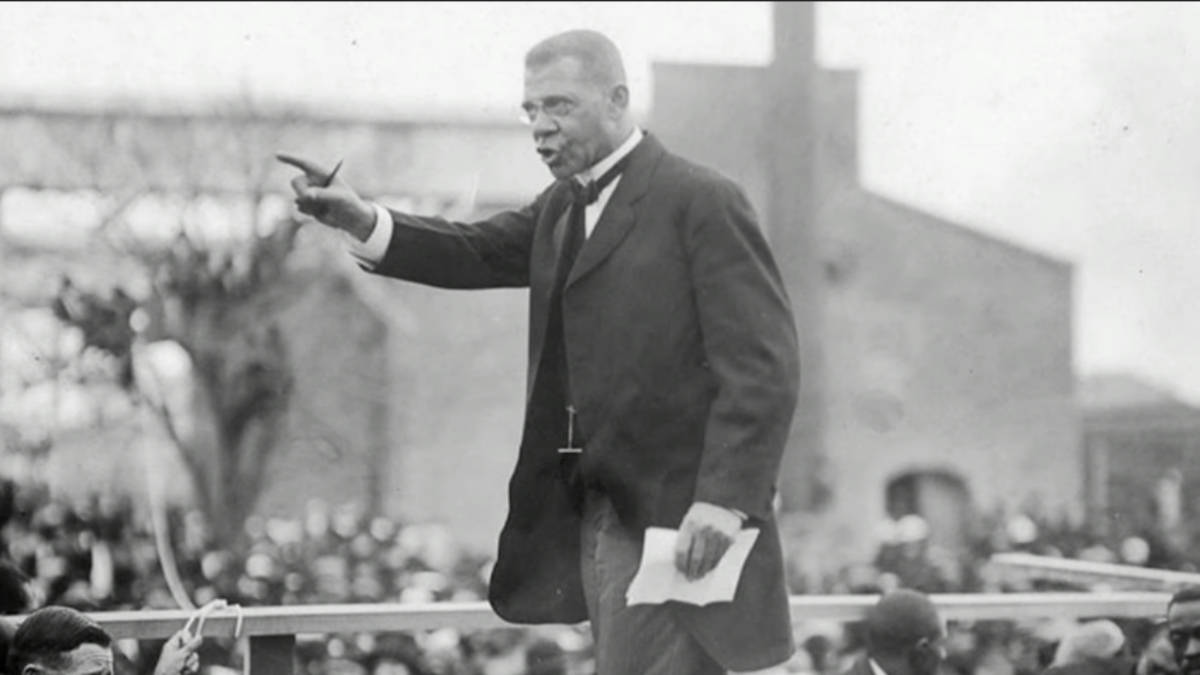It’s no secret that, as a group, black Americans are not exactly thriving. Despite the decades of social welfare policies, activist campaigns, and changing public attitudes, the black community suffers the most dysfunction of any racial group in the U.S.
There’re two popular explanations for this. Those on the left usually blame this situation on systemic racism and unequal opportunities. Those on the right tend to blame the collapse of the family and decadent culture.
Both these views are explored in the documentary “Uncle Tom” directed by Justin Malone and produced by Larry Elder. But there’s a third major factor that has hurt the black community, and it is the focus of the new sequel “Uncle Tom II.” Yes, historical setbacks and the proliferation of broken homes have much to do with the current struggles of black Americans, but there’s also something else that affected the course of black liberation: Marxism.
As “Uncle Tom II” illustrates, nearly all black liberation movements of the past century have been co-opted by Marxists. It was never a simple matter of giving blacks the same rights as whites while otherwise maintaining the American liberal order. The problem is usually framed as the system itself being inherently exploitative and unfair. This has become so prevalent that racism (i.e., the belief in the superiority of one race over another) and oppression (i.e., restricting the freedoms and limiting the power of another) have become synonymous. Consequently, for most people today, fighting racism means fighting the power structures that hold down people who are not white.
As if to debunk this Marxist narrative from the outset, the film begins with images of black families in the past prospering. They are attending church, fathers are present, and everyone’s well dressed. Some of the older commentators of the film, all of them black conservative Christians, recall this time nostalgically.
This is then contrasted in the film with images of chaos and desperation of activists during the George Floyd riots two years ago. Black Lives Matter and Antifa mobs scream at the police, harass bystanders, burn down buildings, loot stores, vandalize public property, and trash city squares. Somehow, by the end of it, Floyd and other famous victims of police violence are sanctified and extolled in a strange cult of black victimhood.
The whole sequence prompts the question: How did the black community go from prosperous and stable to poor and violent? Why are they idolizing these people? For Malone and the other black conservatives commenting on the issue, it is the philosophy of Karl Marx.
Although Marxism began as a class struggle, men like Antonio Gramsci realigned the ideology to suit cultural struggles. From here, it was easy for American Marxists to subvert the path for black prosperity and make it an endless struggle for racial justice.
This can be seen with every new iteration of racial activism. At the head of each campaign is a “trained Marxist,” as the BLM founders memorably put it. Many of them have adopted the tactics of leftist social activist Saul Alinksy, taking to the streets and organizing. Even BLM’s founders were brainwashed by an Alinksy disciple Eric Mann, an old white radical with a long criminal record.
Indeed, one has to go back to the very end of the Civil War with Booker T. Washington to find a black leader who was not a Marxist. As the film makes clear, Washington embodied the very best of the black community by moving past his former life as a slave through education and hard work. He would later make speeches encouraging fellow blacks to do the same and to be productive members of society and would found the Tuskegee Institute to help in this endeavor.
Using footage and photos from those decades following Emancipation, the film makes the point that many black Americans followed the program of Washington and prospered as a result. They attended school, started businesses, went to church, and even gentrified certain neighborhoods. The recent outcry against the Tulsa Massacre in 1921 ironically obscured this important fact that blacks in the segregated South actually had a kind of Wall Street in the first place. The commentators in the film also point out just how quickly Tulsa and the black business community recovered from this supposed devastation.
Unfortunately, Marxist intellectuals like W.E.B. Dubois, a contemporary of Booker T. Washington, set out to undermine Washington’s legacy. As one of the first leaders of the National Association for the Advancement of Colored Peoples (NAACP), he pushed the Marxist narrative that black Americans must unite in a common struggle and seize power from their white oppressors. As for Washington’s message for becoming productive citizens and finding equality this way, this was secondary at best.
This Marxism of Dubois eventually won out against the optimism of Washington during the civil rights movement of the 1960s. Most civil rights leaders, including Martin Luther King Jr., had endorsed Marxism views and won a great victory with Lyndon B. Johnson’s war on poverty. Ever since then, the black community has deteriorated in countless ways. Nevertheless, the black conservatives who call this out are still labeled traitors (“Uncle Toms”) to their community.
On the whole, “Uncle Tom II” raises some important questions and explores a neglected dimension of black history. However, one drawback of the film is its slow pacing and excessive length. Malone has amazing footage of past events and people, but there’s simply too much content that needs to be better edited. Furthermore, the film tends to meander through its claims, which themselves aren’t too clear, making it difficult to follow the line of reasoning.
The end of the film hints at a sequel, which takes specific aim at the civil rights icon Martin Luther King Jr. Such a documentary would be welcome, and Malone has proven himself the man to do it. As it stands, “Uncle Tom II” is a great documentary that not only reveals just how pernicious Marxism has been for black Americans but also how this fate can easily befall all Americans.
Marxism is an idea with the power to ruin even the most prosperous communities. It must be aggressively rejected by every generation.









